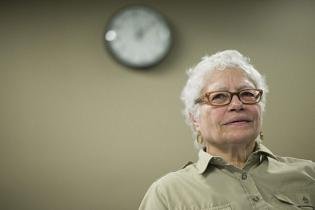Toronto’s Seniors are at High Risk of Ending up Homeless, Report Finds
Toronto’s seniors are at increasingly high risk of eviction and homelessness, because of a lack of easily accessible and age-specific supports, according to a new report.
“We need a better overall picture of where people are falling through the cracks of the whole housing support system and the eviction prevention process, as it currently exists,†said Katie Plaizier, interim programs director for the Centre for Equality Rights in Accommodation, and project manager.
The report, Evictions of Senior Tenants in the GTA: A Call to Action to Curtail An Emerging Crisis, was produced through conversations, surveys and focus groups with seniors, dozens of agencies working or advocating on their behalf and with financial support from the Ontario Trillium Foundation.
What they found, said Plaizier, was not only a lack of senior-specific services, but also that any supports or programs that are available are difficult to find or navigate. The authors defined seniors as people age 50 and older, for the study.
The report details a long list of programs and services that need to be started and then adopted by various levels of government, particularly when it comes to existing rental rules in Ontario. Those solutions include projects to educate seniors and private landlords on the needs of aging tenants, embedding senior-specific protections in any new rental regulations, cities working with the province to create “flexible emergency grants†for seniors facing evictions, and more collaboration between cities and health care providers.
Earlier this month, the federal government pledged to do more for seniors at risk of losing their housing, during the announcement of the creation of a $5 billion national housing fund, part of the forthcoming national housing strategy. The intent, the government said, is to make sure vulnerable people, including seniors, find or keep good homes.
What makes seniors particularly vulnerable is isolation. In Toronto, four out of 10 people who are 85 and older lived alone, according to the report. By 2041, seniors are expected to make up almost 25 of the population in the city, the authors write.
A total of 72 tenants, between the ages of 45 and 90, participated in the survey. Of that group, 42 per cent said they would not know who to call if they received an eviction notice. Most, or 93 per cent, said while they could attend a hearing at the Landlord and Tenant Board, most of them would not be comfortable without an advocate.
One issue managed by the tenant board is debates over above-guideline-rent increases at older buildings, which are often populated by senior tenants.
Sebastienne Incorvaia, 63, fears losing her home because of above-guideline increases at her building at 87 Jameson Ave., in Parkdale.
She lives off a disability pension, every dollar is stretched and a friend helps cover rent. “If it wasn’t for the fact that I was getting help I don’t know if I would be able to be in that apartment,†she said. The owner of the building has said the rent increase is justified and would meet individually with tenants to talk about solutions.
Project manager Plaizier said a key issue is the lack of data on the reasons people are losing their homes.
“Currently there is no overall system or strategy in place to capture who is being evicted,†she said.
The Landlord and Tenant Board, the authors wrote, should amend eviction applications to include an age-related field — largely to facilitate data collection — and should employ a coordinator strictly for senior tenants to make sure they have the supports they need to proceed fairly through a hearing. The board should also, they wrote, provide more education for adjudicators and make eviction data available to the public, to better inform change.
There are some numbers on how interventions tailored to seniors can keep people housed.
Cynthia Summers is the Commissioner of Housing Equity, with Toronto Community Housing. The office is funded by TCH, but is entirely arms-length and was created following the death of 82-year-old Al Gosling, who was evicted by community housing after a paperwork mix-up resulted in him owing rent. After his eviction he stayed in a stairwell, then a shelter, before becoming gravely ill and dying in hospital.
Summers said between December 2016 and September 2014, the office managed 382 cases involving seniors about to be evicted from community housing, many for non-payment of rent. Just 17 were forced to leave, she said. Working with seniors can mean everything from helping them find extra income through tax relief or funds owed to veterans, helping them access support and health services, to improving financial literacy, she said.
“People are afraid to work with their landlord and sometimes the landlords aren’t very good at the interpersonal skills, or the soft skills,†needed to navigate those types of cases, she said. “We really pride ourselves on making tenants feel comfortable.â€
Mary Hynes, with the Toronto Seniors Forum, said women who are suddenly widowed are particularly vulnerable, because in many cases their spouses handled the money, or provided income through better pensions.
There
is a huge chunk of especially who were doing adequately well and
suddenly find themselves in poverty and have no idea what to do,†she
said. “They don’t know where to turn, where their resources are because
some of them are practically hidden.â€
Comments
There are 0 comments on this post





